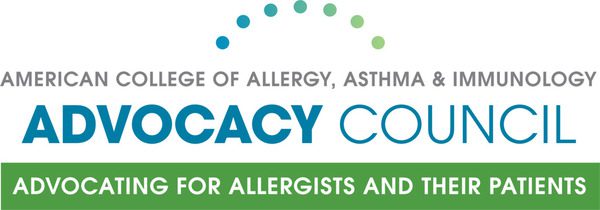
Contact us at AdvocacyCouncil@acaai.org or 847-427-1200.
Members of the College’s Advocacy Council traveled to Capital Hill earlier this week to advocate for higher Medicare payments to physicians. These allergists were in Washington, D.C., as part of the American Medical Association (AMA)’s 2025 National Advocacy Conference where they participated in advocacy meetings with the conference attendees from their respective states. They also spent a day on Capitol Hill conducting meetings separate from the conference.
Congress allowed a 2.5% cut to physician Medicare payments to take effect in 2025 by not including a “doc fix” in the year-end government funding bill that passed in December. Congress must extend federal funding again in March. This funding bill is the most realistic opportunity for Congress to address the 2.5% Medicare cuts that became effective Jan. 1.
ACAAI Executive Director of Advocacy and Government Affairs, Dr. Allen Meadows, and ACAAI’s House of Delegates’ Texas State Delegate, Dr. Vivek Rao, and the Southeast Regions’ Super Delegate, Dr. Steve Dorman, met with staff for senators and representatives who are leading Congress’ efforts to increase Medicare payment to physicians. They also met with Congressional offices that are leaders on allergy and asthma issues.
The allergists had an opportunity to meet Representative Bob Onder, MD (R-MO-03), an allergists who was elected to Congress, after his presentation at the AMA conference.
During these meetings, we learned that there is strong optimism that Congress will mitigate the 2.5% Medicare payment cuts in the March government funding bill.
One big question related to this policy is: will the fix be retroactive or only prospective? A retroactive fix means physicians would need to resubmit claims from the beginning of the year. This is an added administrative burden for only a 2.5% increase. Therefore, Congress might pass a prospective fix but at a higher amount, similar to what was done in 2024 when it passed a 2.9% increase that was only applicable to services provided on or after March 29, 2024. Under this approach, clinicians would not need to resubmit claims for the extra 2.5% payment because the higher payment “fix” amount would account for physicians receiving a 2.5% payment cut for the first few weeks of the year.
We learned that Congress is leaning toward the prospective payment fix option.
The College recently endorsed legislation that would provide a prospective fix, effective April 1st. This bill also provides an additional 2% payment increase as an inflation adjustment. We learned that the inflation adjustment faces an uphill battle in this legislation due to its added cost.
An annual inflationary update is essential for creating a more sustainable Medicare reimbursement framework.
The allergists also met with Congressional offices that champion allergy issues to discuss their priorities for the new Congress. We reiterated the importance of maintaining funding for food allergy research despite a recently announced cap on how much NIH will reimburse grantees for indirect costs.
The Advocacy Council will return to Washington in May for the 2025 Allergy Strike Force and to participate in the Allergy and Asthma Networks; advocacy Capitol Hill Day.
The Advocacy Council – ADVOCATING FOR ALLERGISTS AND THEIR PATIENTS.